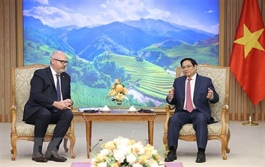42% of European businesses in Vietnam likely to raise investment in country: survey
42% of European businesses in Vietnam likely to raise investment in country: survey
Forty-two percent of European businesses in Vietnam said they expect to increase their investment in the country by this year's end, despite its Business Climate Index (BCI) declining amid a global economic downturn, a survey has shown.

These are among the results of the latest BCI survey recently conducted by the European Chamber of Commerce in Vietnam (EuroCham) and YouGov Decision Lab.
Although Vietnam’s economy grew at a record 13.67 percent year on year in the third quarter of this year, the BCI declined for the second consecutive quarter, dropping 6.4 points from the second quarter and 10.8 points from the first, according to the survey.
Specifically, the index dropped from 68.6 points in the second quarter to 62.2 points in the third in the wake of a global economic recession due to the impacts of an escalating conflict between Russia and Ukraine, persistent inflationary pressures, worldwide labor shortages, and sluggish global growth.
However, in respect of foreign direct investment (FDI), 42 percent of the survey’s respondents expected that their firms would increase FDI flows to Vietnam by the end of this year.
These respondents also believed that Vietnam will be able to attract more FDI inflows by streamlining administrative procedures (68 percent), improving infrastructure (53 percent), removing visa barriers for foreign experts (39 percent), and enhancing human resource quality (39 percent).
The survey showed that two percent of the participants said their firms have relocated a considerable portion of their operations from China to Vietnam.
However, Vietnam can still lure more foreign firms relocating from China if the said obstacles are addressed, many respondents said.
The survey also indicated that August 2022 marked two years of implementation of the EU-Vietnam Free Trade Agreement (EVFTA), but the perception of the benefits of this FTA has slightly decreased compared to the previous quarter.
This decline was attributed to red tape as the main obstacle (38 percent), followed by insufficient understanding of the agreement (18 percent) and technical barriers to trade (16 percent).
However, Chairman of EuroCham Alain Cany commented that Vietnam has offered great investment opportunities to European enterprises in the short and medium terms, and companies from both sides still have plenty of growth potential through the EVFTA.
A bright future is ahead, he commented.
Decision Lab CEO Thue Quist Thomasen predicted that Vietnam will certainly be in a better position in the next two or three years, proving itself as one of the most dynamic business and investment destinations in the world.



















